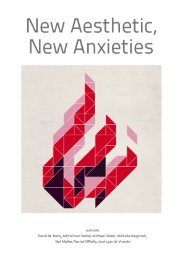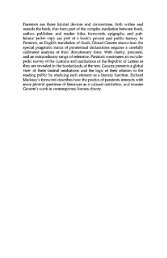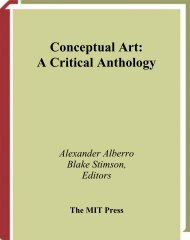You also want an ePaper? Increase the reach of your titles
YUMPU automatically turns print PDFs into web optimized ePapers that Google loves.
of the work, or effectuating itself as work. For this reason, and whatever it may<br />
have claimed for itself, this 'modernity' remained in its principle a humanism.<br />
We will have to return to the question of what brought about - albeit at the<br />
cost of a certain na'ivete or misconception - the exigency of a literar)f experience<br />
of community or communism. This is even, in a sense, the only question. But the<br />
terms of this question all need to be transformed, to be put back into play in a<br />
space that would be distributed quite differently from one composed of all-toofacile<br />
relations (for example, solitude of the writer/collectivity, or<br />
culture/society, or elite/masses - whether these relations be proposed as<br />
oppositions, or, in the spirit of the 'cultural revolutions', as equations). And for<br />
this to happen, the question of community must first of all be put back into play,<br />
for the necessary redistribution of space depends upon it. Before getting to this,<br />
and without rescinding any of the resistant generosity or the active restlessness<br />
of the word 'communism' and without denying anything of the excesses to<br />
which it can lead, but also without forgetting either the burdensome mortgage<br />
that comes along with it or the usury it has (not accidentally) suffered, we must<br />
allow that communism can no longer be the unsurpassable horizon of our time.<br />
And if in fact it no longer is such a horizon, this is not because we have passed<br />
beyond any horizon. Rather, everything is inflected by resignation, as if the new<br />
unsurpassable horizon took form around the disappearance, the impossibility,<br />
or the condemnation of communism. Such reversals are customary; they have<br />
never altered anything. It is the horizons themselves that must be challenged.<br />
The ultimate limit of community, or the limit that is formed by community, as<br />
such, traces an entirely different line. This is why, even as we establish that<br />
communism is no longer our unsurpassable horizon, we must also establish, just<br />
as forcefully, that a communist exigency or demand communicates with the<br />
gesture by means of which we must go farther than at! possible horizons.<br />
The first tas1, in understanding what is at stake here consists in focusing on the<br />
horizon behind us. This means questioning the breakdown in community that<br />
supposedly engendered the modern era. The consciousness of this ordeal<br />
belongs to Rousseau, who figured a society that experienced or acknowledged<br />
the loss or degradation of a communitarian (and communicative) intimacy - a<br />
society producing, of necessity, the solitary figure, but one whose desire and<br />
intention was to produce the citizen of a free sovereign community. Whereas<br />
political theoreticians preceding him had thought mainly in terms of the<br />
institution of a State, or the regulation of a society, Rousseau, although he<br />
borrowed a great deal from them, was perhaps the first thinker of community,<br />
or more exactly, the first to experience the question of society as an uneasiness<br />
directed towards the community, and as the consciousness of a (perhaps<br />
Nancy/ /The Inoperative Community/ /59








